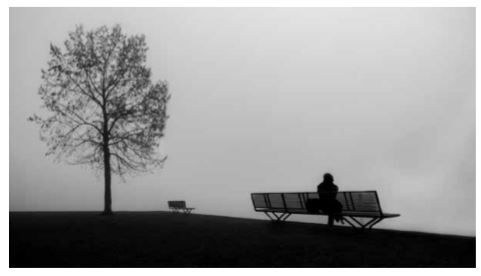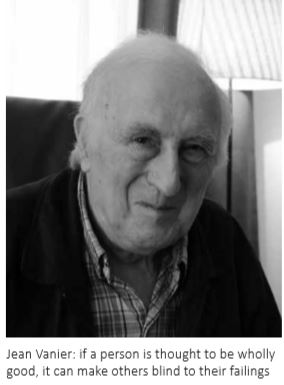After L’Arche founder Jean Vanier died, an inquiry found he had sexually abused six women. Could women with learning disabilities also have been victims? Noelle Blackman and Lynne Tooze report, and discuss why the odds are stacked against vulnerable people who speak up
Allegations of sexual abuse against Jean Vanier, the charismatic founder of the L’Arche communities, emerged in February 2020, shortly after his death in 2019. They were made public following an independent investigation commissioned by the charity.
Vanier set up the first L’Arche community in 1964 in a small house in Trosly-Breuil in France. He invited two men who were living in institutions to move in. The community was a response to the plight of people with a learning disability institutionalised in France. He wrote books, was nominated for the Nobel Peace prize, received several awards and was admired by many. His vision was for people with a learning disability to be able to contribute to society and live equally alongside people without a learning disability, The investigation concerned mainly the relationship Jean Vanier had with his mentor and teacher Father Thomas Philippe, but also considered specific allegations against Vanier himself.
The news that then emerged – that Vanier sexually abused six women from 1970 to 2005 – is a real blow. It is similarly distressing to discover that Father Thomas Philippe was also known to have sexually abused women. At Respond, we were dismayed about what had happened and wanted to try to make sense of it. Sadly, however, we were not entirely shocked.
Respond is an organisation that offers therapy, advocacy and support to children, young people and adults with a learning disability, autism or both, who have experienced trauma. We work with people who have experienced abuse as well as those who abuse others. This helps us to understand that the world is not full of people who are wholly good and those who are wholly bad – everyone is capable of being both. It is unhelpful to hold such closed views about people, because it can lead to blind spots that are dangerous.
When we work with people who have sexually abused others, we take a lot of time understanding their life histories up to the point we meet them. We often find they have experienced a lot of trauma and may have been sexually abused by others.
Understanding the person in the context of their lived experience enables us to see them as a person first and foremost, to develop a therapeutic relationship with them and to hold a belief that they can change.
Power weakens others
Vanier was seen as a wholly good person, a saint – indeed, he was in line to be canonised. This would have made it difficult for people accept any concerns they might have felt, to discuss these with others or even to have been believed. It would also have made it extremely difficult for the people abused by him to make sense of what happened to them and to tell others.
The abuse was carried out through a relationship that had an extreme power imbalance. Vanier was a man of God and couched his abuse within a spiritual context. It was a complete abuse of his power and this disabled these able women. It may have been difficult for them even to conceptualise what was happening to them. In this context, it is easy to see why the disabling effect of power would have been even stronger over women with learning disabilities.
We are very aware of the separation in our society between people with and without a learning disability. L’Arche is well known for its aim, within its communities, to create what it calls a “culture of shared lives between people with and without intellectual disabilities, from which… to build a more human society” (L’Arche International, 2020a). It seems difficult to understand why women with a learning disability were not included in the investigation, or at least why the concept that there could have been a risk of inappropriate sexual behaviour towards them was not addressed.
L’Arche’s initial comment regarding whether any disabled women were sexually abused by the founder was equivocal. Their statement says: “There is nothing in the investigation to suggest that Jean Vanier harmed people with disabilities” (L’Arche International, 2020b).
This does not fit well with what we know from research and what we hear from women with a learning disability, which is that they are more likely to experience sexual abuse (End the Fear, 2015). Anyone who works with survivors is likely to say that the abuse uncovered so far is probably the tip of the iceberg.
Sexual abuse of people with a learning disability remains a mostly invisible issue. There are many barriers to disclosing. These include an inequality of power with others involved in their lives, not being listened to and a failure by others to note changes in how they are communicating. There are also often strong reactions of repulsion, disbelief or shock that such a thing could really have happened. Sometimes, investigations are quickly closed through denial.
Sexual abuse has its own impacts – blame, shame, fear, desperation, guilt, suffering – which make disclosure difficult, sometimes impossible. Only some of the many people referred to Respond’s survivors’ service have been able to let someone know about such abuse.
But there are others who are referred because someone has noticed a change in their behaviour and understood this to be connected to something that has happened to them. These people have decided to speak up and say that they believe something traumatic has happened.
Behaviour: challenging – or cry for help?
It is rare for people with learning disabilities to be described simply through the things they can do, what they are interested in or how it feels to be in a friendship. More often, they are seen and understood through a fairly narrow and rather specific lens. It is likely that this is focused on their behaviour.
The framework currently being used to understand this is positive behaviour support (PBS). While it has its uses, it can be limited and, in our experience, often does not address how traumatic life  events may affect the way a person responds to the world. That is why we hear so much about people being labelled as having behaviour that challenges.
events may affect the way a person responds to the world. That is why we hear so much about people being labelled as having behaviour that challenges.
In our experience, this behaviour is often a form of communication – it can be an expression that something unspeakable happened to them. How invisible are the symptoms of sexual abuse? It can be easy to interpret a person’s behaviour as meaning something else because that is more palatable. Because of this, people can be frightened to speak up about any concerns they have in relation to a person’s behaviour. One of the general reactions found in society is dismissal or disbelief. At Respond, through our survivor services, we see this type of denial response regularly in many different types of organisations.
Sexual abuse of this group of women elicits the most illogical and prejudicial responses within statutory and voluntary agencies alike. There is often a reaction of repulsion or denial. This can feel like an ignorant denial of shocking and traumatic disclosures, particularly when the perpetrator is seen with affection, admired or respected.
However, the responses in the L’Arche case are complicated. Its statement seems to deny the possibility that women with learning disabilities in its communities could have been sexually abused by its founder. Even communities and organisations set up with equality and integration at their very core can lose touch with those values when faced with having to think about the unthinkable. But this is not altogether a surprise because it is hard to come to terms with such a shocking violation of trust.
To have to reframe a saint as a perpetrator is bad enough, but to have to believe that the dream that this man had built – a man who had inspired so many others to work with him on this vision – has been violated is just too difficult to bear to think about. To think about something so painful, support is often needed in the form of supervision or reflective practice. In too many services, this is not prioritised, yet the damage done to people’s lives when this investment is not made is huge.
Most heinous act
Sexual abuse of a person with learning disabilities is one of the most heinous acts – a physical, sexual, psychological and spiritual attack on the most vulnerable – those who are only too often unable to receive justice and are unprotected. There are always difficulties around disclosures – fear and the knowledge of being undervalued in society. Sexual abuse has its own impacts – blame, guilt, fear and desperation. How then do women with a learning disability, autism or both express and disclose in such potentially hostile and dismissive environments?
Denial is the response experienced too frequently. Given how difficult it is for these women to disclose, how can they speak to anyone or receive the response they need? They need to depend on the strengths of those around them to be prepared to walk a difficult path together.
Towards the end of February, Irene Tuffrey Wijne was that person. She is a good friend of Respond and had been inspired directly by Jean Vanier early in her career to work with people with learning disabilities. She lived and worked in one of his communities. She, like so many others, was shocked and distressed to hear the breaking news and, after taking a short time to reflect, recognised what was most needed.
The people in her community needed to take time together to think about what had happened, to support each other with their feelings about this and to know that, together, they could support each other to think about how best to move forward. All support and care organisations – L’Arche among them – have safeguarding and conduct policies that indicate an open culture where disclosures of abuse or suspicions of it are welcomed. This is clearly positive. But such policies must be accessible to people with a learning disability, with a guarantee of being heard if they speak up.
Here at Respond, we are ready to offer support to anyone, anywhere, who wishes to speak up and reaches out to us.
● Summary Report. L’Arche International. 2020. ttps://tinyurl.com/tbupobc
● Respond: https://respond.org.uk/
Noelle Blackman is chief ex ecutive and Lynne Tooze is independent sexual violence adviser co-ordinator at Respond
References
L’Arche International. 2020a. What We Do. https://www.larche.org/what-we-do End the Fear. 2015. Disabled Women 2 To 5 Times are more Likely to Experience Sexual Violence than Non-Disabled Women. https://tinyurl.com/y7qsdyba L’Arche International. 2020b. L’Arche International Inquiry into Historic Sexual Abuse by Jean Vanier. www.larche.org.uk/news/ inquiry-statement
